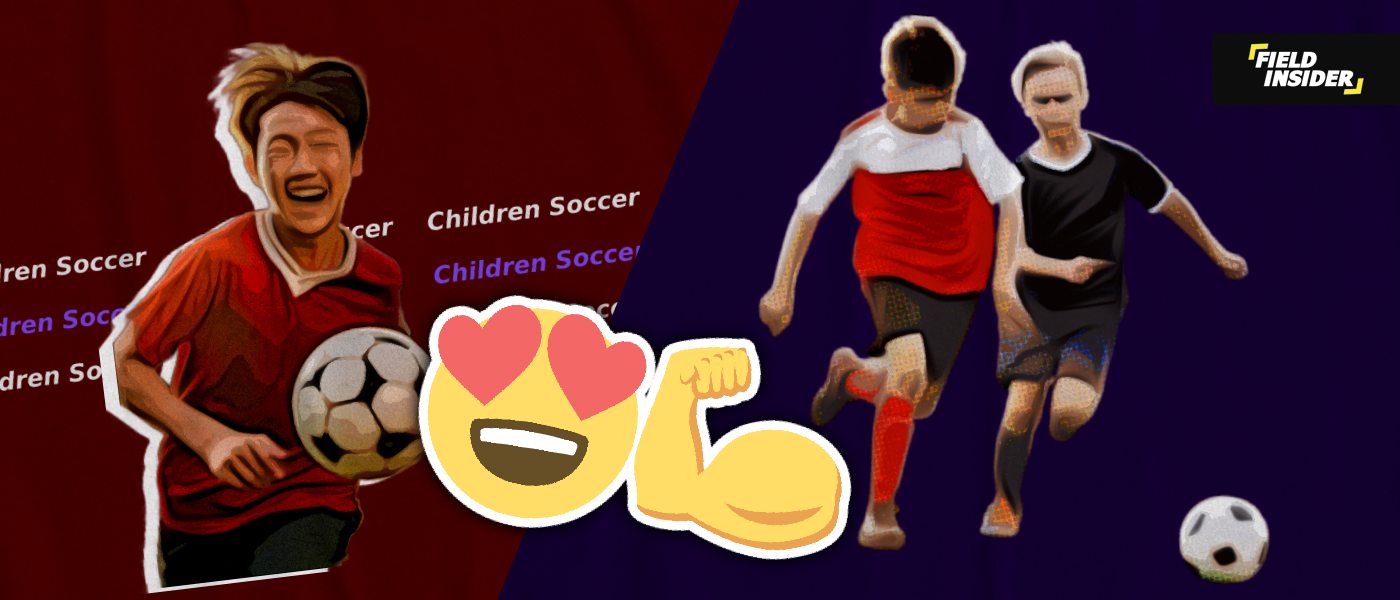What Are The Benefits Of Children Training Soccer?
Introduction
Soccer reigns as one of the most beloved sports among children globally, cherished for its dynamic play and universal appeal. As parents and educators, it’s crucial to understand the extensive benefits that children soccer training can offer young players.
This article explores the comprehensive advantages of engaging children in soccer, from improving cardiovascular health and coordination to fostering teamwork and resilience, highlighting why soccer is much more than just a game.
Key Takeaways
| Category | Key Takeaways |
|---|---|
| Physical Health | Improves cardiovascular health, enhances motor skills and coordination, increases strength and endurance. |
| Mental and Emotional Growth | Boosts self-confidence and self-esteem, develops teamwork and cooperation, sharpens focus and concentration. |
| Social Skills | Builds friendships and camaraderie, instills respect for authority, promotes cultural understanding. |
| Future Opportunities | Opens potential scholarship opportunities, nurtures transferable skills, establishes healthy lifestyle habits. |
Physical Benefits of Soccer Training for Children

Cardiovascular Health Improvement
Soccer involves consistent, dynamic movement which is excellent for cardiovascular fitness. Children benefit from improved heart rate and lung capacity, leading to enhanced stamina and endurance. Engaging in soccer from a young age sets a foundation for lifelong cardiovascular health.
Enhanced Motor Skills and Coordination
The diverse skills required in soccer, such as dribbling, passing, and controlling the ball, significantly enhance motor skills and coordination. This improvement is vital for young children as it boosts their ability to perform various physical activities with better agility and precision.
Soccer drills focus on these skills continuously, promoting physical development and confidence in their abilities.
Development of Strength and Endurance
Playing soccer requires a combination of quick sprints, sustained running, and explosive movements, all of which contribute to muscle development and enhanced physical endurance.
Regular training helps children build stronger muscles and improve their overall physical resilience. It prepares them for various sports and physical challenges. This strength-building aspect is integral to a well-rounded physical training in football, supporting their growth across different physical dimensions.
Mental Benefits of Soccer Training for Children
Boosted Self-Confidence and Self-Esteem
Children participating in soccer experience a profound boost in self-confidence and self-esteem with each new skill they master and each goal they score. These successes not only bring joy and satisfaction but also instill a strong sense of self-worth and capability.
This increased confidence extends beyond the soccer field, influencing their performance in school and their interactions in various social situations. It makes them more assertive and self-assured.
Learning Teamwork and Cooperation
Soccer necessitates a collaborative approach to achieve team goals, teaching children the critical skill of teamwork. Through soccer, children learn to communicate effectively, support their peers, and work collectively towards a common objective.
These teamwork skills are invaluable, fostering cooperation and understanding among peers, which are vital for future academic and professional settings. Engaging in team sports like soccer demonstrates the importance of unity and collective effort in achieving success.
Sharpened Focus and Concentration
The dynamic environment of soccer demands constant mental engagement and quick thinking, which significantly enhances a child’s ability to focus and concentrate. Children learn to maintain their mental alertness throughout a game, a skill that translates well to academic learning and other areas.
The need for continuous attention and tactical thinking in soccer helps develop a child’s cognitive abilities, improving their capacity for concentration and detail-oriented thinking in various aspects of life.
Soccer’s Impact on Youth Health and Well-being
The chart below is based upon the finding of a study titled “Benefits of Youth Sports” . The study reveals that most parents see soccer’s positive impact on their children’s mental and physical health.

As per the chart, 73% of respondents agree that the sport positively influences their child’s mental health. This is not only a testament to soccer’s physical demands but also its capacity to foster team spirit and resilience among young athletes.
Moreover, the bar chart further details that an even larger segment, 88%, confirm the sport’s contribution to physical health. These findings are critical, especially considering soccer’s growing popularity as a chosen activity for children.
The data encapsulated in the chart not only informs but also encourages a dialogue on incorporating soccer into children’s routines for its comprehensive health benefits.
Social Benefits of Soccer Training for Children

Building Friendships and Camaraderie
Soccer provides a communal environment where children can interact with peers who share a similar interest, fostering friendships and a sense of camaraderie. These relationships often extend beyond the pitch, providing children with a social network that supports them emotionally and socially.
The sport offers an excellent opportunity for children to develop social skills, learn about teamwork, and form bonds that can last a lifetime.
Learning to Respect Authority Figures
The structured environment of soccer, with coaches, referees, and team leaders, teaches children to respect authority figures. This respect is crucial in developing discipline and understanding the importance of following rules and instructions.
Engaging with authority figures in soccer helps children learn to accept guidance and criticism constructively, which is beneficial in educational settings and future workplaces.
Exposure to Diversity and Cultural Understanding
Soccer is a global sport that attracts players from diverse backgrounds. Participating in soccer allows children to interact with individuals from different cultures and backgrounds, promoting a greater understanding and appreciation of diversity.
This exposure is invaluable as it teaches inclusivity and global awareness, preparing children for a more interconnected world. As they meet and play with peers from various backgrounds, they learn valuable lessons about acceptance and cultural sensitivity.
Emotional Benefits of Soccer Training for Children
Stress Relief and Emotional Regulation
Participating in soccer offers children an effective outlet for releasing stress and managing their emotions. The physical activity involved in playing soccer helps in reducing stress levels by triggering the release of endorphins, known as the body’s natural mood elevators.
Additionally, the sport teaches children how to handle emotions during both high and low moments in the game, aiding in their emotional regulation skills. This ability to manage emotions is crucial for mental health and relationships.
Coping with Success and Failure
Soccer, like many sports, involves winning and losing, providing children with early lessons in both success and failure. These experiences teach them to celebrate victories with grace and accept losses with resilience.
Learning to cope with various outcomes in soccer helps children develop a balanced perspective on life’s ups and downs, enhancing their ability to face future challenges with courage and steadiness. The emotional resilience they build is crucial for personal growth and success in all areas of life.
Development of Resilience and Perseverance
The competitive nature of soccer requires children to continually strive to improve their skills and overcome challenges, fostering resilience and perseverance.
Whether it’s working to come back after a defeat or pushing through a tough training session, soccer instills a sense of determination and the understanding that persistence leads to improvement. These qualities are not only important on the field but also translate into other aspects of their lives.
Long-term Benefits of Soccer Training for Children
Potential for Scholarship Opportunities
For skilled and committed young players, soccer offers the possibility of earning athletic scholarships that can greatly assist with higher education costs. These opportunities provide not only financial relief but also recognition and motivation for students to excel academically and athletically.
Pursuing soccer at a competitive level can open doors to prestigious schools and programs, enriching a child’s educational journey and career prospects.
Transferable Skills Applicable Beyond Soccer
The discipline, teamwork, leadership, and time management skills learned through soccer are highly transferable and sought after in many life domains.
These skills enhance a child’s capability to navigate complex situations in school, future careers, and personal life effectively. Engaging in soccer helps in cultivating these attributes early on, providing a foundation for professional success and personal development.
Establishing Healthy Lifestyle Habits

Regular participation in soccer instills important lifestyle habits such as regular physical activity, teamwork, and persistent effort. These habits lead to better health and social interactions, setting children on a path to maintaining an active lifestyle long into adulthood.
The routine and discipline learned through soccer are critical in helping children develop routines that prioritize health and well-being, ensuring they grow into healthy, active adults.
Conclusion
The myriad benefits of training in soccer provide a compelling argument for parents to consider this sport for their children. From physical health improvements to the development of invaluable life skills, soccer offers holistic development.
It equips children not only to excel on the field but also supports their growth into well-rounded individuals. This makes it more than just a game; it’s a valuable life journey.








